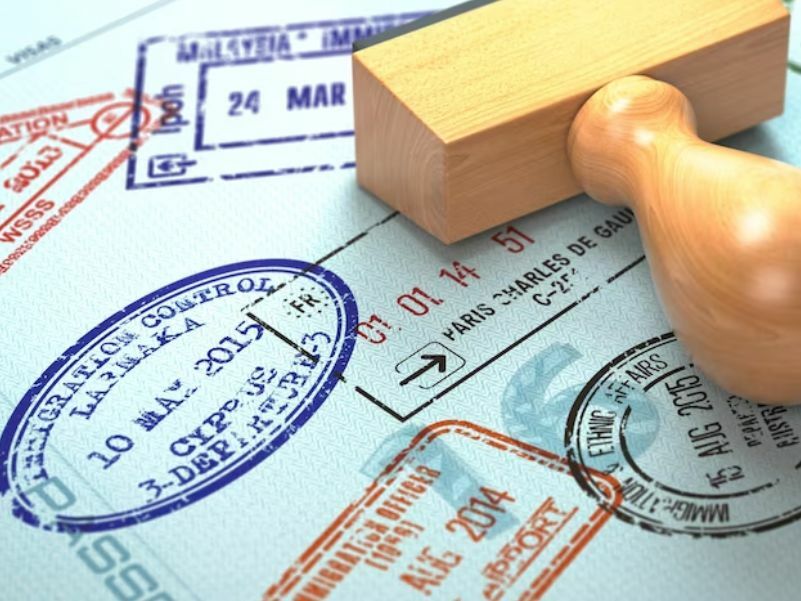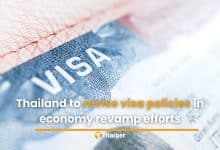Your guide to a visa run in Thailand

Visa run in Thailand refers to the practice of leaving the country temporarily in order to reset or renew one’s visa or extend their permitted stay in the country. This is often done by foreign tourists, ex-pats, or digital nomads who wish to stay in Thailand for a longer period than their visa or visa exemption allows.
Typically, a visa run involves travelling to a neighbouring country, such as Laos, Cambodia, Myanmar, or Malaysia, for a short period of time (usually a few hours to a day) before returning to Thailand. Upon re-entry, the visitor’s passport is stamped with a new entry, which restarts their visa or visa-exempt stay duration.
Visa run in Thailand

Thailand permits a 30-day stay for foreign nationals without requiring a visa. Indeed, this is feasible without any applications, documentation, or waiting. Any individual possessing a valid passport will be granted a 30-day stamp upon entering Thailand, allowing them to remain within the country. To extend their stay, all they need to do is exit Thailand before the current stamp’s expiration date and then re-enter to obtain another 30-day stamp. There is no mandatory waiting period for re-entry; one can leave and return on the same day legally.
Visa runs in Thailand involve travelling to another country and then returning. This process is straightforward and easy. However, there are certain aspects to consider and be aware of before undertaking a Thailand visa run.
What are the types of visa run in Thailand?

Border runs
Boder runs is the quickest and most common type of visa run. It involves travelling to a nearby land border, exiting Thailand, and then immediately re-entering the country. This is usually done by tourists on visa exemptions or short-term visas who want to extend their stay by a few more weeks. Popular border crossings for this type of visa run include Mae Sai in Chiang Rai (bordering Myanmar), Nong Khai or Vientiane (bordering Laos), and Ban Laem or Poipet (bordering Cambodia).
Visa renewal trips
This involves travelling to a neighbouring country with a Thai embassy or consulate to apply for a new visa. This is typically done by individuals who need to obtain a longer-term visa, such as a tourist visa, a non-immigrant visa, or an education visa.
Who is eligible for a visa run in Thailand?

Tourists
Visitors from countries that have a visa exemption agreement with Thailand can enter the country without a visa for a limited duration (usually 30 days if arriving by air or 15 days if arriving by land). These tourists may perform a visa run to extend their stay in Thailand.
Digital nomads
Individuals working remotely or freelancing while staying in Thailand might also undertake visa runs to prolong their stay in the country.
Expats
People living in Thailand on short-term visas, such as volunteer visas, may also qualify for a visa run.
Language students
Some individuals studying the Thai language on short-term education visas might also choose to do a visa run.
How does a visa run in Thailand?

Undertaking a visa run in Thailand involves having a visa exemption stamp in your passport, leaving the country before it expires, and returning the same day to renew the exemption stamp for an additional period.
Be cautious not to exceed the allowed number of visa runs, as abusing the country’s laws could result in penalties. You may be required to obtain a specific visa, such as a multiple-entry Tourist Visa or a Non-Immigrant O Visa with multiple entries, for future entries into Thailand.
If you’re unable to make it to the Thai border before the 30-day stamp expires, you must visit the nearest Immigration Office to extend your visa legally. You’ll need to adhere to the country’s visa extension requirements, submit the necessary documents, and pay any associated fees.
Many foreign nationals who perform border runs may not be familiar with Thailand’s regulations and might be unsure about their options when their visa expires. In such cases, it’s advisable to consult a specialized visa agency for guidance.
What do I need for a visa run in Thailand?

A valid passport
Ensure your passport is valid for at least six months from the date of your planned re-entry into Thailand. Also, make sure you have enough blank pages for the new entry and exit stamps.
Sufficient funds
You may show proof of sufficient funds for your stay in Thailand upon re-entry. The general requirement is 10,000 THB per person or 20,000 THB per family.
Proof of onward travel
Immigration officers might ask for evidence of onward travel, such as a flight or bus ticket showing that you will leave Thailand within the allowed stay duration.
Visa fee
If you’re applying for a new visa at a Thai embassy or consulate in a neighboring country during your visa run, you’ll need to pay the applicable visa fee, which varies depending on the type of visa you’re applying for.
Visa application form and supporting documents
When applying for a new visa, you’ll need to complete the visa application form and provide any required supporting documents, such as passport-sized photos, proof of accommodation, or an invitation letter.
Transportation
Arrange transportation to the border crossing or neighbouring country where you plan to carry out your visa run. This could be by bus, train, car, or flight, depending on your location and destination. Ensure you have all necessary tickets or reservations in advance.
Knowledge of local border procedures
Familiarise yourself with the specific border crossing procedures and requirements at your chosen location. This may include understanding the operating hours of the border checkpoint, the need for any additional permits, or fees for entering the neighbouring country.
Prepare these items and be aware of the necessary procedures to equip yourself well for a visa run in Thailand. However, it’s essential to stay updated on the latest Thai immigration policies and regulations, as they may change over time.
Be aware
When planning a visa run in Thailand, it’s essential to be aware of the following points to ensure a smooth and hassle-free experience:
Visa run restrictions
Thai immigration authorities have become stricter with visa runs in recent years. Repeated visa runs might raise suspicion, and you could be denied entry if the authorities believe you are abusing the visa exemption or short-term visa system. Avoid relying solely on visa runs for extended stays in Thailand.
Visa types
Understand the various visa options available for your needs, such as tourist visas, non-immigrant visas, and education visas. If you require a longer stay in Thailand, consider applying for an appropriate long-term visa instead of relying on visa runs.
Visa run service providers
Some companies offer visa-run services, which can simplify the process by providing transportation, guidance, and assistance with border procedures. Research these providers and choose a reputable one if you decide to use their services.
Can I apply for a visa run on a long-term stay?

Visa runs in Thailand do not provide an ideal solution for long-term stays because short-term visitors typically intend to use them to extend their stay briefly. Relying on visa runs for an extended period may raise suspicion among immigration authorities. And you could be denied entry if they believe you are abusing the visa exemption or short-term visa system.
For long-term stays in Thailand, it is recommended to apply for an appropriate long-term visa. For example, a Non-Immigrant Visa, which may include categories like:
1. Non-Immigrant B Visa: For individuals who plan to work or conduct business in Thailand.
2. Non-Immigrant O Visa: For those visiting family members, retirees, or volunteering in the country.
3. Non-Immigrant ED Visa: For students who plan to study in Thailand, such as attending a school or learning Thai language courses.
4. Non-Immigrant O-A Visa: For retirees who meet specific financial requirements and wish to stay in Thailand long-term.
Obtaining a long-term visa will help you avoid complications with immigration authorities and ensure a more stable and secure stay in the country. Remember to check the latest visa regulations and requirements, as they may change over time.
Benefits of visa run in Thailand
Short-term extension
Visa runs offer a quick and relatively easy way to extend your stay in Thailand for a short period. Usually another 30 days, if you haven’t planned your visa duration accurately.
Flexibility for short trips
They provide flexibility for short trips outside Thailand, allowing you to return and resume your stay without applying for a re-entry permit (for multiple-entry visas).
Cost-effective (potentially)
Depending on the chosen border crossing and mode of transportation, visa runs can be cheaper than applying for a visa extension within Thailand.
Drawbacks of visa run in Thailand
Uncertainty and risk
Thai immigration has become stricter with visa runs. Frequent runs can raise suspicion and lead to denied re-entry.
Time consuming
Visa runs involve travel time, border crossing procedures, and potential delays, taking away from your time in Thailand.
Financial costs
Transportation, border crossing fees, and potential service provider fees can add up, making visa runs less cost-effective than initially thought.
Visa runs can be a temporary solution, but they come with drawbacks. Carefully consider your needs, research alternative visa options, and weigh the potential risks and costs before deciding if a visa run is the right choice for you. Consulting a visa specialist can help you navigate the legalities and choose the most suitable path for your situation in Thailand.
Latest Thailand News
Follow The Thaiger on Google News:


























